last updated November, 2018
A health game is any game designed specifically to improve a person's health. This can be achieved in a variety of ways, but most often health games are trying to directly address a person's health by creating a game that helps them stay well, or recover from a negative health event. Many health games also focus on professional development, data development or analysis, and training. These categories of health games seek to improve the provision of healthcare to people who need it.
Is there any dispute that games make for great entertainment? Of course not! One only has to look at the billions spent globally each year on games to realize that they are a huge industry and media form. Even the board game market worldwide is surging due to increasing popularity for games in all their forms digital and non-digital. For decades, and especially over the last 20 years there have been many organizations and individuals building games for purposes beyond entertainment but the question is why?
In some cases proponents of health games cite the wide appeal of games, their ability to draw in players and "engage" them as a critical reason to use games. In a world where attentions are increasingly divided and competed for there does exist some logic to any form of media and messaging that breaks through to get critical attention. Others cite the growing technological power of videogames and especially 3D environments as their motivation to use games. However, these are not the only, or even the best reason to use games for applied purposes. Games do more than grab and hold attention.
Research and examples increasingly show that games may have unique qualities over other forms of media when it comes to tasks such as education, skill development, data-analysis, and behavior change to name a few. These qualities have much to do with the forms games take that enable new communication forms, how games enable dynamic adaptation to users, how games offer better approaches to systems-based thinking, and more. 3D games, while popular, are not always the best solution either. Many simple 2D, and even text games have proven to be very powerful, and often optimized, experiences.
Given that games may have special capacities we also should consider the problems to begin with when discussing 'why games?' In today's complicated and ever-more sophisticated world there is increasing emphasis for an "all-hands-on-deck" approach to problem solving. This is especially true as it relates to health & healthcare. While tried-and-true solutions such as public service announcements can be useful for health issues PSAs have limited reach to youth, and fairly limited capacities for inducing behavior change. The same can be said for seminar and counseling interventions, and more.
Through the growth of health games there is increasing sentiment to add games, when evidence shows success, to the mix of media and non-media tools we use to solves today's most vexing health problems.
Through a variety of research projects conducted since the late 1990s there is a growing body of evidence that games can play an effective role in improving health. For example, a game played by pediatric cancer patients, Re-Mission, by HopeLab was shown to have improved a variety of psychological markers, and a biomarker, that included improved adherence to chemotherapy. Another study of a sex-education game showed good improvements concerning knowledge gained. Other games have been shown to improve nutrition outcomes, diabetes outcomes, lazy eye, and more.
Another interesting finding from research is that sometimes games work as an intervention for certain demographics where other interventions have failed. In research looking at the appeal of DanceDance Revolution as an alternative fitness activity for youth, West Virginia researchers found that there were a cohort of kids who had shunned organized team sports, and didn't take to other alternatives offered during gym or recess such as running, weight lifting or jazz dance. HopeLab also did some psychographic research into exercise and health opinions among youth and found a similar styled cohort attracted specifically to the opportunity to combine games and physical fitness. It's not that games can't work for wide arrays of people and profiles, they can, but there are definitely characteristics of games that can potentially succeed at engagement where other interventions are themselves not succeeding.
Despite studies providing evidence that games can work, we also know that there have been games that have failed. They either outright failed, or they didn't necessarily improve results vs. existing solutions. Games might fail because they aren't engaging, or they provide unforeseen sideeffects, or they proved hard to reach audiences-at-scale. There are no sure things.
It thus can be said, "games can work, but projects can fail."
What's important toward making sure a game works is not only that the game be well designed, and aimed properly at the underlying problem, but that, as with many forms of learning, and behavior change, that the players are supported by both the game and surrounding systems be they mentors, teachers, additional materials, calls-to-action, and more.
Quality affects health game projects no different than other intervention designs, but it is exciting to know that there are excellent examples where games have risen to the challenge offering overall promise to the next great projects.
One of the more interesting elements of the games for health field is how many types of games exist in at least one instance. The gamut of activity is wide, if not deep. This reinforces the opportunity that games can be a strategic resource to organizations that are active in health & healthcare.
TABLE 1.1 showcases a variety of health games that have been developed and showcases the gamut of activity that has taken place in the field so far.
Game |
Type |
Image |
Explanation |
| Elude | Patient Empathy | 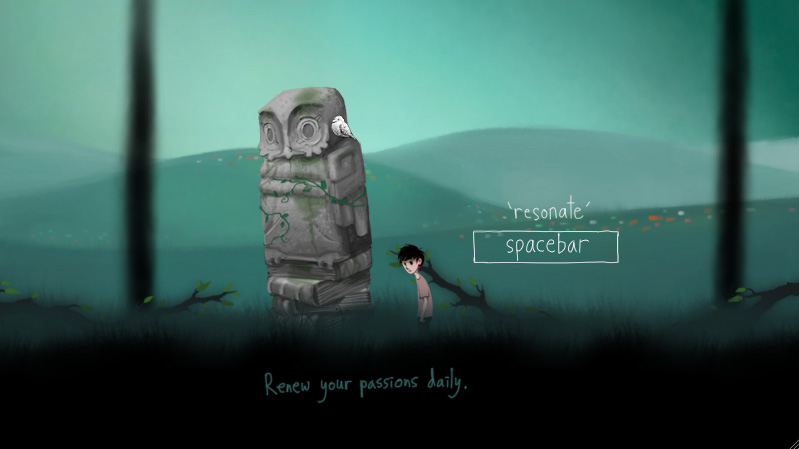 |
Elude is a game that tries to help players understand what it feels like to have highs and lows associated with bipolar / depressive feelings. |
| Re-Mission | Oncology Disease Management | 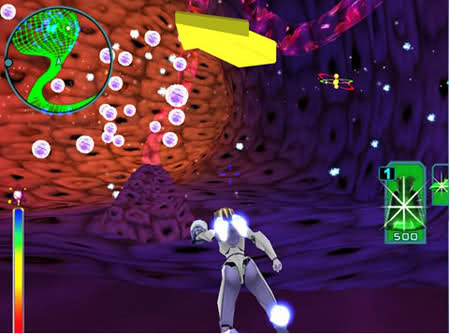 |
Re-mission lets players fly inside the body of a child facing cancer and battle the cancer and side-effects of cancer while learning how to deal with, and defeat cancer. |
| PlayForward | Sexual Health Decision Making | 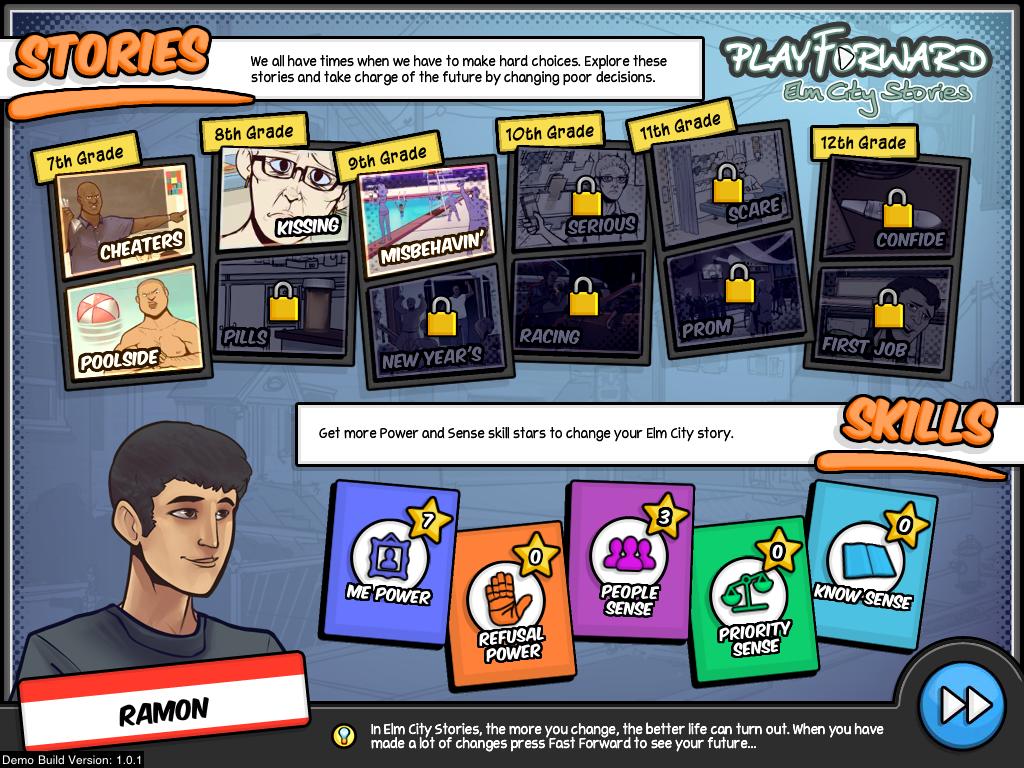 |
PlayForward helps young-players understand the risks, and good decision making related to high-risk situations involving drugs, alcohol, and sexual activity. |
| Rehabilium | Rehabitainment | 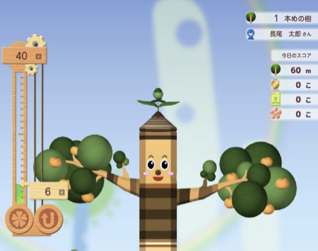 |
Rehabilium, from Kyushu University in Japan, incentivizes people who can, but don't stand up often, and need incentive and support to stand up, hold their balance, and return to their seat. |
| Zombies Run | Exergaming | 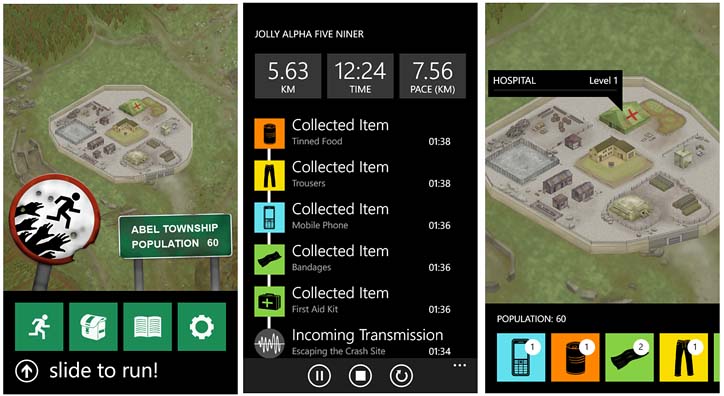 |
Zombies Run is a game that tells you a story, and incentivizes you to start running. |
| Lit2Quit | Smoking Cecessation |  |
The Lit Smoking Cecessation game is designed to help mimic breathing exercises that can help reduce the urge to smoke. |
| Pox | Public Health Education and Virology | 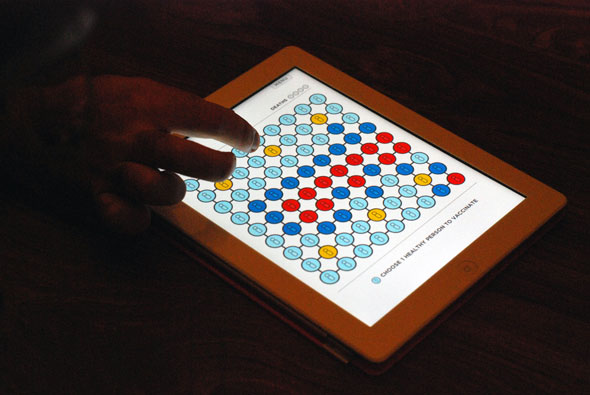 |
Pox is both a board and electronic game designed to help introduce core elements behind how immunity and population-based immunity works to fight the spread of communicable diseases. |
| That Dragon Cancer | Patient Advocacy & Education | 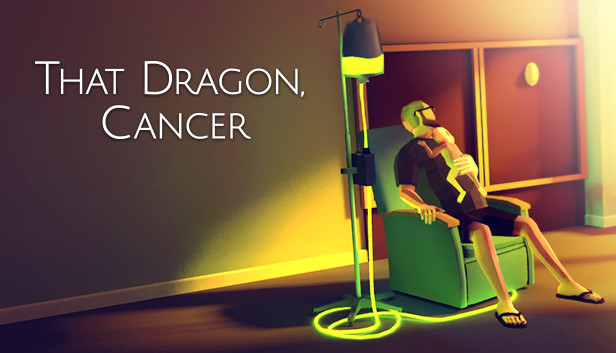 |
That Dragon Cancer is the interactive story of a family dealing with the fate of one of thier children who has cancer. |
| Project Evo | Neurotherapuetics | 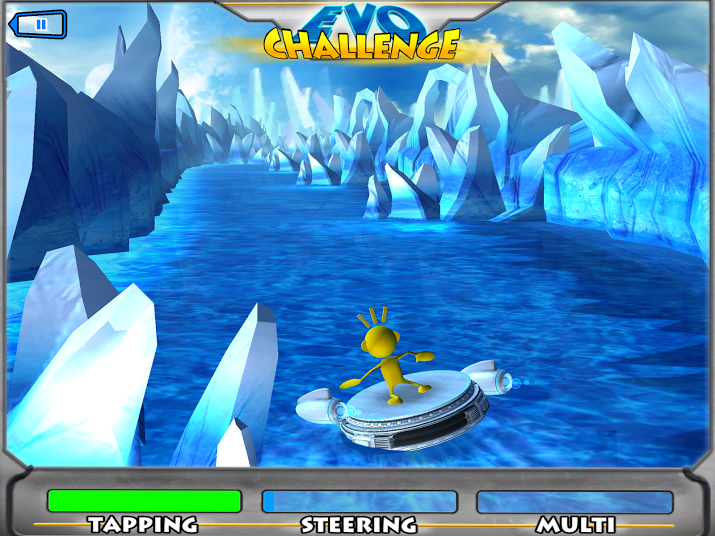 |
Akili Interactive's games are researching how games can help to improve therapies related to add/adhd, and other issues that degrade focus and attention. |
| Night Shift | Training & Professional Development | 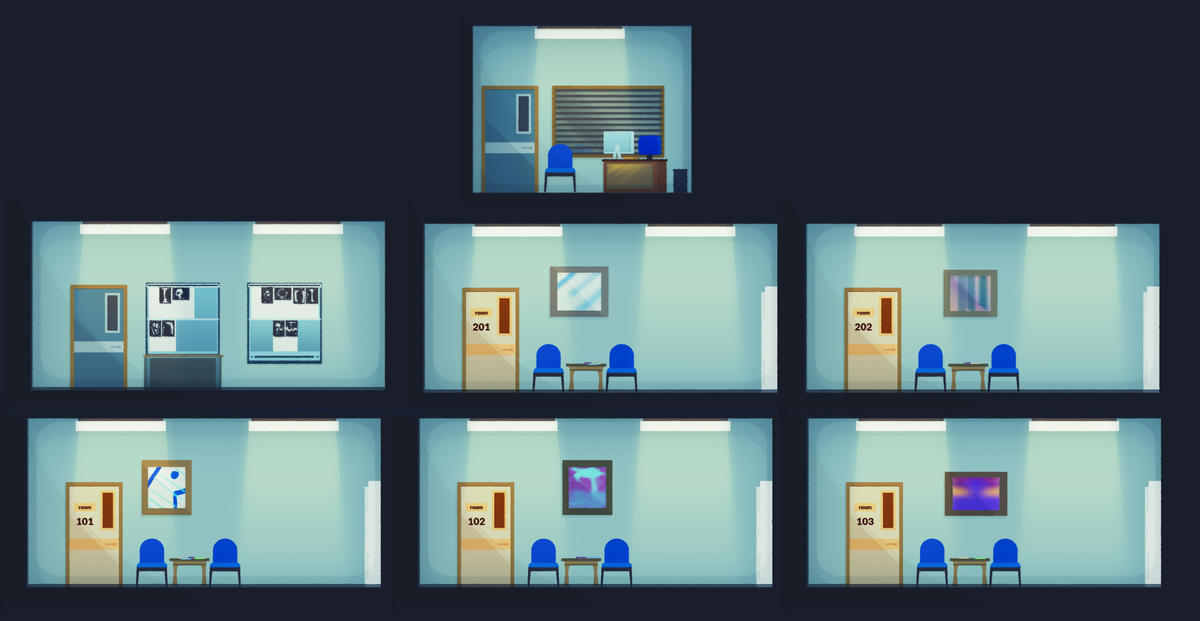 |
Night Shift by Schell Games, places physicians in the shoes of an emergency medicine doctor who is faced with different critical care situations. |
Yes you can! There are many stories of people using games to get themselves healthier. Many of these instances are exergames like Zombies Run! or Wii Fit, and Just Dance, that help people exercise more which has many positive effects beyond just weight-loss or management.
Many other people report using games such as match-3 games like Bejewelled to relax and fight off day-ot-day stress. Others report using games to avoid urges such as smoking or snacking, substituting gameplay instead until the interest fades.
In terms of specialized games for health, there are various clinical trials underway for games that help with physical therapy, games that help with ADHD therapy, and more. The ideal versions of these games will go through rigorous studies and government approvals before they are released and in many cases be provided to you under supervision of a licensed therapist or MD.
It depends, and you definitely want to confer with a lawyer familiar with the latest regulatory frameworks and laws related to digital health, therapies, and health devices.
Exercise games, and other wellness oriented games likely do not need regulatory approval, especially if they do not provide direct medical advice or made specific unverified and approved claims about their effects. For example, saying using this game will prevent Alzheimers or dementia is a specific medical claim and will certainly create a problem for you vs. saying your game is relaxing and fun to play after a long hard day.
There are many issues involving health and healthcare designed to prevent health products from harming their users or giving them false faith in a product's potential benefits. This is why any health game developer should make themselves familiar with the rules involving health and medical products not only in one country, but in EVERY country they plan to release their game in.
While regulatory approval may seem daunting, and it often can be, the benefit for products that gain such approvals is that they can make approved claims for their products, they can attract higher levels of investment and partnership from large health concerns, and they have a marketable edge vs. those products not able to make and qualify their claims.
The best advice for developers is to present a version of their health game idea to a qualified attorney or regulatory expert prior to developing AND marketing their product. Often games can be adjusted both in design, and especially in how they present and market themselves to avoid costly mistakes.
Serious games tend to be made by seven types of game/software developers:
1. Developers who build games of all shapes and sizes : These hybrid developers seek to leverage their commercial game expertise to help build excellent health game projects.
2. Developers who specialize in serious games or games for health : Some developers choose to specialize in serious games, or even specific segments of serious games such as health. They often have a educational technologies background, or feature entertainment game designers who have left those markets behind to focus on new markets like serious games.
3. Media production companies : Often companies that produce web-based media and apps will seek to work with their clients to create games. While these companies tend to do best with advertising style-games (i.e. advergames) they seek to bring their client service focus and understanding of production values and legal issues involve health, pharma, and healthcare marketing rules from those projects to health games. The downside for them is their game design skills tend to be fairly basic, and their understanding of learning and behavior change design is also limited.
4. University based programs : Either as student work, or part of grant-based research a lot of health games work is based in the world's colleges and universities. Often these are experimental programs but every so often they reach full maturity and make it out as part of a larger public-facing project, university spinoff, or startup.
5. Start ups : There are a number of companies that are building game-based businesses in health, learning, and more. They are not producing a game for clients, but instead as part of their core business.
6. Independent and hobbyist developers : There are a number of small games produced by hobbyist and independent developers that cover topics of interest to them. While not everyone is rhetorical in nature, many of these often ephemeral games, are often game-based commentaries on their subjects, current events, or matters of personal storytelling. Given the prominent role health plays in our lives there have been a number of hobbyist and indie developer games centered around health such as the moving game The Dragon Cancer.
7. Internal development teams at health and healthcare companies : Be it pharmaceutical companies, medical device makers, insurance, or health & wellness providers many companies in the health & healthcare industries have large internal development resource or external development networks they can tap into to build their own health games, products, and services. As the digital health space expands expect to see more directly built, or managed projects in the games for health space coming directly from established companies.
Creating a health game is not a simple process. In many cases the funding is significant, and the work takes a year or more.
Most organizations and individuals who want to build a health game are themselves not game designers or developers. Additionally, they may not have much background in software development. They do, often have the expertise in the underlying subject matter, and a keen awareness of the problem they are trying to solve and what has, and hasn't worked thus far in contributing to a solution. As such, they must seek out the technical and production talent to make their game.
Making games takes a lot of work, time, and often capital, but most of all they need "keepers-of-the-vision" to manage them from idea to finished project. Assuming you are bringing the idea, and ideally the capital what you need first of all is a well-articulated outline of your problem, and eventually an informed design document that matches up possible game ideas to the problems and their specifics that are put together.
Once there is proper articulation of the challenge, the target audience, and some basic ideas of game-based approaches that will work, you can further iterate on the paper designs and plans. Assuming you have well-though-out plans the next step is to identify one or more developers and begin to get them to bid and comment on your project.
Picking a developer and contracting with them may seem like the end, but it's only the beginning. No matter how talented and experienced all developers benefit when the idea-holder, and their expertise is brought to bear on a project, helping with as much of the design, production feedback, and testing as they can.
Great health games get made when good teams are properly supported and financed. Your game gets made once you have a well articulated plan that not only explains the idea for the game but defines the problem(s) the game is aimed at in great detail such that development talent can best match-up great creativity, game design, and technology toward the solutions you need at the budget you can afford.
Much of this means you will be working with external teams to your organization. Like many media productions organizations undertake be they videos, pamphlets, posters, books, or web sites, games are no different in that they are communication and collaboration style projects that require a dedication to upfront planning and backend polish.
Your get your game made when you bring all the right resources and careful thinking to a patient process imbued with the best talent you can muster.
Games can cost as little as a few thousand dollars to millions of dollars - it's very wide open. Typically most health games efforts cost $50K-$300K for smaller size projects, board games, mobile, and web games with tightly focused designs. Larger six-figure projects often expand gameplay to more involved gameplay, higher-production values, and deeper levels of content and curriculum covered, or they involved more advanced technologies such as virtual reality, 3D graphics, or advanced forms of online play. In the million dollar ranges the driver is often the style of game you're building, and how deep-and-long the gameplay has to be to satisfy the challenge it is trying to solve. Multiplayer features, and extensive cloud-based features can also be major cost-drivers to a project as well.
As a rule-of-thumb developers tend to charge $10K-$12K or more per-person, per-month. So a small team of 5 developers working full time over the course of six months to build a game might have a budget of $300,000 or more. More experienced teams in high-demand, and higher-cost-of-living markets, can easily charge more than the $10K-$12K rule-of-thumb.
In cases where projects can cut costs to build the least-expensive games tactics will include not just simplifying gameplay, but also eschewing certain features such as more involved tutorials teaching novice users how to play, better art, or lack of online play. Cleverness in design can also play a role as well but can't be pre-ordained as the solution to the cost-of-serious-games question.
The costs discussed so far are also just for core design, production, and completion. They may not include costs to deploy the game, promotion, user-support, hosting, and more. This is especially true with health games that will want to deal with showing important elements of efficacy through rigorously clinical trials. If your goal is to achieve a game that clears various regulatory hurdles for health claims and effectiveness the costs could be many times the actual cost of the game. Even if the project is meant to help with engagement there can be legal hurdles around health marketing rules that can slow down the development process and add to the costs. Backend costs could also be more expensive depending on costs to comply with various health privacy laws. Thus, the costs and rigors of the health games world can create added costs not seen in some other areas like games for training, or education.
While there are certainly games, quite successful ones, built on budgets below $50,000, it really must be said that most organizations should be prepared for minimum budgets in the low six-figures range. If you're not prepared to spend in these ranges, which for many games are tiny still, it's really going to be difficult for developers to offer a solution you might put reasonable faith in.
Hopefully you will! In most health game project cases to date a clear sponsor funds the creation of a game, be it by grant, or as part of their cost of doing business. A large swath of the serious games space overall (including work on health games) is a work-for-hire services-based development industry. Clients produce problems and capital, developers build games they hope offer a solution. Yes, in a number of rising cases, developers are raising funds and/or building health games first, and attempting to commercialize them but aside from some key markets (e.g. exercise) these efforts are not broadly applied.
You may have heard that many health games are funded through grants. This is true to an extent, many health games are part of research or public interest funding provided by governments and philanthropic foundations. Many others are funded by enterprises for their internal user (e.g. training) or external use (marketing and customer support) and only a handful so far are funded as commercial products for sale to target users.
The bottom line is you will need to secure the funding for your game. Most developers are fee-for-service companies and are not looking to build games, however interesting they may be, on spec. If you haven't already secured funding you will want to look into various forms of financing for games be they grants or other means of raising funds.
Yes. In some leading categories like exercise, there are health games that make back more than they cost to develop and market. Some other consumer wellness games have done ok, but the vast majority of health games are still trying to figure out their market potential so they can exist beyond being research projects and effective prototypes.
Given the structure of health & healthcare, how they're paid for, and the need for digital health to still prove its return-on-investment large-scale revenues in the health games field remain elusive. As digital health grows, and developers make better games geared better for sustainable revenues it is expected there will be more successes than the few mass-consumer exercise titles that dominate so far.
There is much to know to learn how to make any game let alone one a health related game. Health games lay at the intersection of many domains of knowledge including game design, software development, psychology, cognitive science, behavior change, biology, and much more. Health game projects have lots of unique features that make their development processes, while similar to entertainment games, different. Depending on your role in the process of creating a health game it is helpful to understand the basics of making games, providing input into production, and managing creative, iterative productions.
Since so many health games deal with issues around behavior change and persuasive health technologies it is also a good idea to study up on these areas of activity. Whether it's to understand ideas like social learning theory, message framing, behavioral economics, or the theory of planned behaviors, the last few decades have produced a plethora of evidence-based theories about learning, and behavior change that is critical to the creation of successful health games. This knowledge is not always held by developers, or it's understood, but not in a formalized manner even though many game design philosophies do dovetail with successful learning and behavior change practices.
Beyond the technical knowledge, and the domain knowledge relevant to what your game is about, the most important thing to know to make health games is working with teams of creatives, and how to capture constructive feedback that you can feed back into the game development process.
All-in-all what you need to know to make a good health game is how to identify, and eventually supplement across the team of professionals building your game the various knowledge bases that you bring together to make a great health or healthcare game. This can be a little bit of everything, but often includes the core domain knowledge of the game's subject, and the evidence-based theories that drive outcomes for your problem area.
Games research is quite a robust and ongoing area of activity. Hundreds of university based projects exist, many robust university programs focus exclusively on looking at the impact and capacities of games across a range of sectors.
There is a growing body of work around the use of games for purposes beyond entertainment especially in education, and health, to cite and build upon. Some of it is contained in journals that focus on games, game technologies, and serious games, however, it's important to know that a lot of work on the subject is also published in fields specific to the topic of the game and/or the problem it's addressing. This is especially true for health games where there are many health journals that are the preferred choice to publish in. This is why when working to find prior work, and evidence you will want to look not only for generalized games research, but also specific research within the field/topic your game is targeting.
To pinpoint several papers or research projects that may be useful can be difficult but the resources on SeriousGames.Tips and PlayfulHealth.tips can help you look for research, games, journals, and conferences that may be useful for your efforts.
On PlayfulHealth.Tips are many links to useful resources to follow up with via the Web, social media, books conferences, and video. Additional links and resources can also be found on our sister-site SeriousGames.Tips.